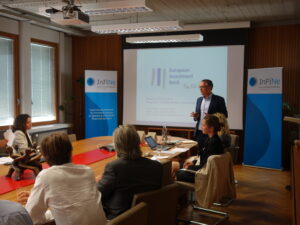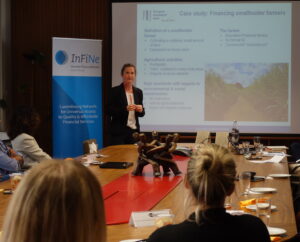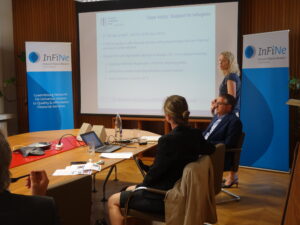10 July 2019
 The EIB Microfinance Unit was at the House of Microfinance to present to InFiNe.lu members the work the EIB is doing in microfinance. Olivier Edelman, Head of EIB Microfinance Unit, provided an overview of the importance of microfinance within EIB. EIB supports direct operations of large microfinance institutions (Tier 1 MFIs) through medium/long term loans and direct equity investments in financial intermediaries; and indirect operations of smaller institutions (Tier 2 and 3 MFIs) and specific themes, such as agriculture through equity and debt investments in Microfinance Investment vehicles and Investments Funds. In addition, EIB provides technical assistance to its microfinance partners.
The EIB Microfinance Unit was at the House of Microfinance to present to InFiNe.lu members the work the EIB is doing in microfinance. Olivier Edelman, Head of EIB Microfinance Unit, provided an overview of the importance of microfinance within EIB. EIB supports direct operations of large microfinance institutions (Tier 1 MFIs) through medium/long term loans and direct equity investments in financial intermediaries; and indirect operations of smaller institutions (Tier 2 and 3 MFIs) and specific themes, such as agriculture through equity and debt investments in Microfinance Investment vehicles and Investments Funds. In addition, EIB provides technical assistance to its microfinance partners.
According to the EIB microfinance unit, the current challenges in the microfinance sector are:
 Hannah Siedek, Microfinance Investment Officer EIB, focused her presentation on EIB facility to finance smallholder farmers who cultivate a small amount of land and dependent on family labour. The total amount of the facility is EUR 25m equivalent in local currencies. The goal of the facility is to strengthen financial inclusion of smallholder farmers, to refinance smallholders (less than 5 HA) and agri-food companies and to improve agricultural practices. To invest in that field, EIB applies strict environmental and social guidelines.
Hannah Siedek, Microfinance Investment Officer EIB, focused her presentation on EIB facility to finance smallholder farmers who cultivate a small amount of land and dependent on family labour. The total amount of the facility is EUR 25m equivalent in local currencies. The goal of the facility is to strengthen financial inclusion of smallholder farmers, to refinance smallholders (less than 5 HA) and agri-food companies and to improve agricultural practices. To invest in that field, EIB applies strict environmental and social guidelines.
 The second case study presented by Sonja Mohnen, Microfinance Investment Officer EIB, focussed on support refugees and the specific case of Microfund for Women (MFW) in Jordan. MFW is the 1st MFI in Jordan to offer financial services (only group lending) and non-financial services to Syrian refugees. MFW started its activity with refugees in 2016 with shareholder decision to allocate JOD 1m to refugee financing. The results were impressive. Indeed, the Portfolio at Risk (PAR) 30 for refugees loans was smaller than the PAR30 for the remaining portfolio. Therefore, MFW decided to increase the funding allocated to refugee financing. EIB has provided a 2nd loan to MFW and decided to provide specific technical assistance.
The second case study presented by Sonja Mohnen, Microfinance Investment Officer EIB, focussed on support refugees and the specific case of Microfund for Women (MFW) in Jordan. MFW is the 1st MFI in Jordan to offer financial services (only group lending) and non-financial services to Syrian refugees. MFW started its activity with refugees in 2016 with shareholder decision to allocate JOD 1m to refugee financing. The results were impressive. Indeed, the Portfolio at Risk (PAR) 30 for refugees loans was smaller than the PAR30 for the remaining portfolio. Therefore, MFW decided to increase the funding allocated to refugee financing. EIB has provided a 2nd loan to MFW and decided to provide specific technical assistance.
InFiNe is the Luxembourg platform that brings together public, private and civil society actors involved in inclusive finance. The value of InFiNe lies in the wide range of expertise characterised by the diversity of its members.
With the support of

Inclusive Finance Network Luxembourg
39, rue Glesener
L-1631 Luxembourg
G.-D. de Luxembourg
Tel: +352 28 37 15 09
contact@infine.lu
R.C.S. : F 9956
Legal notice
Privacy notice
Picture 1 © Pallab Seth
